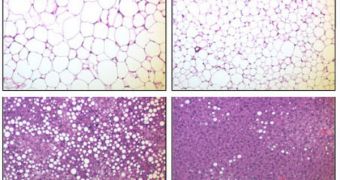A group of experts at the Brown University says that a special enzyme can be used in mice to reduce rodents' weight gain. At the same time, the animals display an improved metabolism, and show significantly higher insulin efficiency than their peers.
These results are very encouraging, if they could only be applied to humans as well. Researchers explain that the new enzyme could for example be included in treatments against obesity and diabetes.
Both these disorders are extremely widespread in the general population, especially in the developed world. In the United States alone, more than 66 percent of people are either overweight or obese, whereas diabetes is affecting about 26 million people.
However, figures are a lot higher in actuality, since it's estimated that as many as 57 million people in this country alone suffer from pre-diabetes. This means that they are extremely liable to developing the condition in the near future. Already, diabetes costs the US about $132 billion yearly.
Under these conditions, discovering a therapy that at least reduces the influence the disease has could have significant impacts in terms of both money and quality-of-life improvements for millions.
“Turning on this molecule has a very dramatic impact on lipid metabolism,” Brown Warren Alpert Medical School assistant research professor of medicine Haiyan Xu explains. She is also based at the Rhode Island Hospital’s Hallett Center for Diabetes and Endocrinology.
Xu was the corresponding author for the new paper detailing the results, which will be published in the January 2012 issue of the esteemed medical journal Endocrinology. The findings will also be made available online before publication in print.
In the rodent study, the enzyme IKKbeta acted by reducing weight. This may not seem related to insulin sensitivity at first, but researchers say that the two are more connected than immediately apparent.
“Lower body weight is always a beneficial thing for influencing insulin sensitivity. Reduced adiposity wins over increased inflammation,” Xu explains. At the same time, lab mice who were fed diets high in this enzyme also exhibited improved overall metabolism.
The Brown University team is now very curious to learn whether the same types of positive effects can be seen in humans as well. This can only be determined by conducting a series of human trials, but that is likely to take some time.

 14 DAY TRIAL //
14 DAY TRIAL //